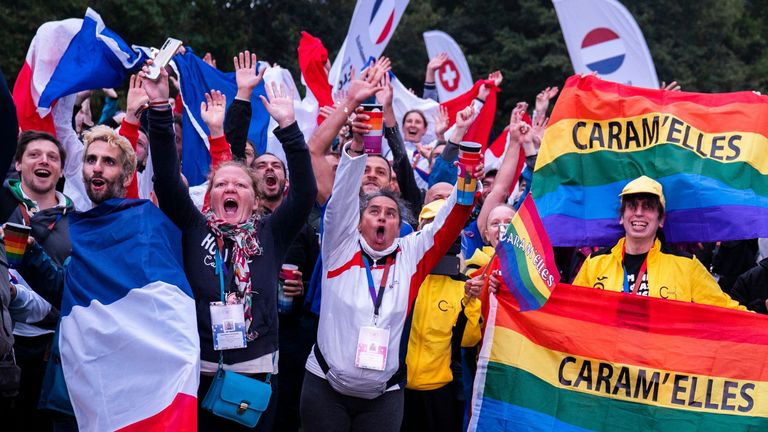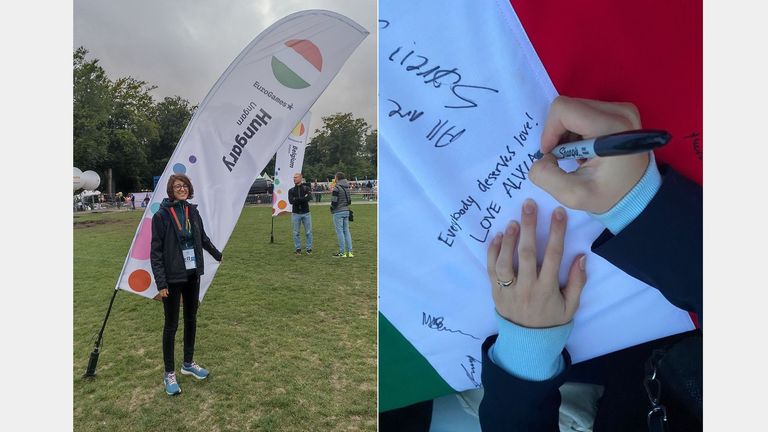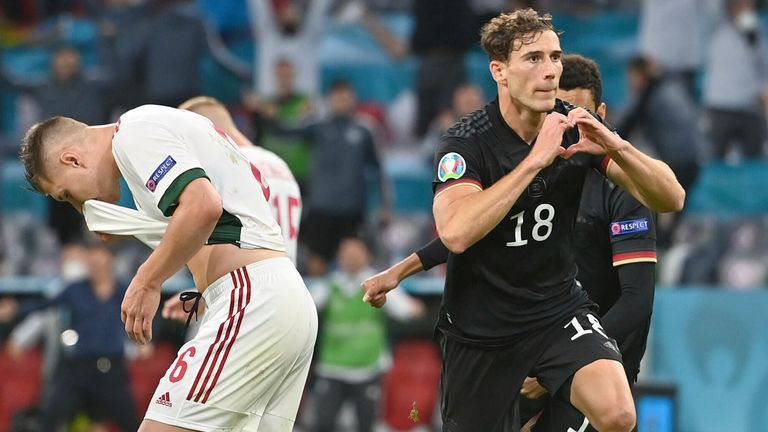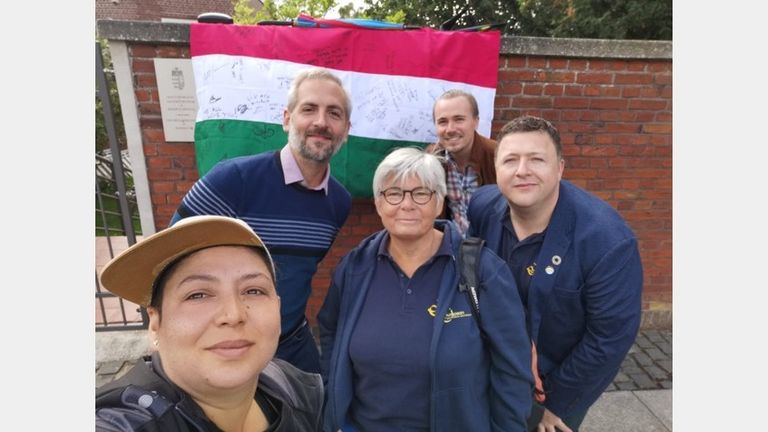EuroGames: Sports festival at Copenhagen 2021 WorldPride welcomes LGBTQ+ athletes from Hungary fighting for freedom
Rainbow solidarity was shown to LGBTQ+ people in Hungary during Euro 2020 and at the recent Grand Prix in the country - but what was the effect? At EuroGames, an inclusive multisports event, athletes from Eastern Europe explain how visibility offers hope amid the increasing hostility
Friday 20 August 2021 13:43, UK
"It's so great to participate in an event where we can all feel much more free."
Dorka Szekeres is one of around 2,000 athletes competing at EuroGames, an international multisports festival being held this week in Copenhagen and Malmo. She has travelled from Budapest to represent her club, Atlasz, and to enjoy Saturday's WorldPride Marches in Denmark's capital.
Her primary ambition is not to win medals but to experience a sense of genuine liberty, something she rarely gets to appreciate back home.
"For me, it's special to come to a country that is so different from Hungary," she tells Sky Sports. "Here, you don't have to hide who you are."
Nine years ago, Szekeres helped to stage EuroGames in Budapest - it was the first and so far, the only occasion that the event has been held in Eastern Europe. Each edition is licensed to a club affiliated to EGLSF (the European Gay and Lesbian Sport Federation), an LGBTQ+-inclusive body that unites 125 member organisations from across the continent.
"It was huge - one of the highlights of my life. It wasn't long after my own coming out and I worked on EuroGames for a year. It was also the first time that I met a lot of LGBTQ+ people," she explains.
"What's important is that I'm still building on those relationships now. I've travelled here to Copenhagen with friends I made when we organised the event in Budapest together."
Earlier in 2012, Hungary's ruling Fidesz party under Prime Minister Viktor Orban had introduced a new national constitution focused on 'traditional, Christian values'. Despite this, members of the European Parliament attending that summer's EuroGames opening ceremony spoke of their hopes for the future and the significance of the venue. "All Hungarians can be very proud that such a major event takes place in Budapest," said the country's former foreign minister, Kinga Goncz.
Two years later, Orban's attempt to push through an authoritarian 'internet tax' failed and since then, he has pursued national pride through populist policies - toughening asylum laws after warning of "migrant armies" flooding the country, then targeting transgender people by stripping them of legal recognition, then effectively banning same-sex couples from adopting children.
For Szekeres, watching her country rewind on human rights over the last decade has been painful. "When we were organising EuroGames, there was absolutely no support from the government, from the local municipality, or anyone. They were not really attacking us back then - it wasn't hostile. But it has changed a lot in the last few years.
"Fidesz has always worked in such a way that they have needed a common enemy. First, it was migrants. Now, as the elections are coming up, it's the LGBTQ+ community."
Atlasz has been offering a welcoming space for Hungarian people who love sport and who are either LGBTQ+ or allies since the club was launched in 2004. Before the pandemic hit, it had over 300 registered members active in football, swimming, running, squash, and other sports. Now the numbers have dropped to around 100, partly due to Covid but also because some feel too scared to be connected to such a group.
Szekeres' passion is table tennis - she has helped to bring more women into Atlasz by promoting ping pong through qLit, a magazine which she co-founded.
"The whole point was always to provide a platform for LGBTQ+ people to make friendships. Atlasz continues to achieve that, with programmes throughout the year.
"Times may be bad, but I know that through volunteering, we are making change, particularly for all those people who join us but who are afraid to come out elsewhere in their lives."
Football and F1 stars make a stand
During Euro 2020 and at the recent Hungarian Grand Prix, elite sport helped to shine a light on the worsening LGBTQ+ rights situation in Hungary. This activism was largely in response to a law passed by the country's Parliament that ostensibly seeks to protect under-18s from 'harmful' material, but which is discriminatory in its assessment of LGBTQ+ content - and even conflates homosexuality with paedophilia.
For Hungarian citizens such as those who are members of Atlasz, the solidarity shown through sport by western European nations like the UK, Germany and the Netherlands has strengthened their resolve, even though the situation at home is worsening.
UEFA may have refused the mayor of Munich's request to light up the Allianz Arena in Pride flag colours when Germany played Hungary at the Euros, but the symbolic illuminations of other stadiums, the rainbow armband worn by Manuel Neuer, and Leon Goretzka's 'love heart' goal celebration towards the Magyar fans combined to send a powerful message.
Meanwhile, although Sebastian Vettel's race weekend at the Hungaroring ultimately ended in disqualification, his 'Same Love' T-shirt statement - plus the vocal support of Lewis Hamilton - further energised LGBTQ+ communities within a population of 10 million.
"The effect was important," says Szekeres. "We could feel that we are not that alone, as we had earlier thought, and that there are other people who can speak up for us.
"It's always a question if that has any effect in reality, and whether it changes anything or not. But the biggest help that we can get is visibility. We need other nations to speak up.
"Eventually, talking will not be enough. That will be a question for the European Union - but giving us visibility, that can help."
The Fidesz government has long valued the spectacle of sport and has sought to use it for political gain. Since Orban has been in power, an estimated £2bn has been spent on revitalising Hungarian football - the Puskas Arena, where England will play Hungary in a World Cup Qualifier next month, cost around £460m, while over a dozen clubs have received new stadiums.
One of these sides, Puskas Akademia, was only founded in 2005 as a countryside village team but they finished last season as top-flight runners-up. Akademia's Pancho Arena ground holds more than double the number of villagers resident in Felcsut, 25 miles west of the capital. Its most famous former resident? Orban himself. The place where the Prime Minister grew up is now the wealthiest district in the whole of Hungary.
At the Tokyo Olympics, the country enjoyed another relatively successful Games, finishing with 20 medals, its best overall haul since Atlanta 1996. Orban is already talking of another attempt to win hosting rights - a referendum initiated by the opposition Momentum party over projected high costs resulted in Budapest's bid for the 2024 Games being withdrawn. Orban recently claimed a lack of "national unity" was the reason for Fidesz losing the vote.
Szekeres expects the sportswashing to continue. "There are quite a few sports that the government loves," she explains, "but football is the first. And they just pour money into it.
"However, when I say football, I mean only men's football. Women's sport is not really supported." Unsurprisingly in such a climate, there is no recognition for LGBTQ+ inclusion.
Fears of 'fascism' - but the fight continues
As a sports club, Atlasz never had any desire to be at the centre of attention. Yet more widely in Hungary, queer people increasingly find themselves thrust into political debate fuelled by state-owned media. For Szekeres and her community, this constant dialogue is draining and corrosive. "Hungary never used to talk about LGBTQ+ people as much as it does today. Many would have never even thought about us before.
"Now though, they think they should hate us, based on what they hear every day. It's not looking good. The elections are coming up in April, so we shall see what happens."
Before then, in an attempt to somehow prove that its anti-LGBTQ+ 'Child Protection Act' is the will of the Hungarian people, Orban has pledged to put the new law to a referendum. Yet the questions for the vote, which have already been approved by an election panel, have been criticised as ambiguous and leading. Question 4 asks the following: "Do you support the unrestricted sharing of media content with underage children that influences their sexual development?"
For the Hungarians attending EuroGames and WorldPride, the chance to get away from the constant chatter of negativity at home is a welcome escape, even more so after the curfews and restrictions at the height of the pandemic. Away from the sporting events, workshops and panel discussions are allowing Atlasz and other clubs to build stronger connections and support each other.
The 'CEEYOUSPORT' project, led by EGLSF on funding from a European Union grant, is helping to facilitate this. Drawing on the expertise of clubs such as Copenhagen's Pan Idraet (the EuroGames 2021 hosts) and those in different cities spanning the continent from Scotland to Bulgaria, the aim is to share knowledge about fundraising, communications, project management and more between EGLSF members.
Covid has meant that job shadowing and exchange programmes between clubs has been severely limited over the last 18 months, but at EuroGames, everyone can be together in one place again.
Jelena Celebic is one of the project leaders, and they are also the founder of FemSlam, a football organisation in Serbia. "When people gather and meet in person and not online, there is a lot of camaraderie - we come together and share experiences. For me, this is the biggest value of this project.
"Sometimes you're worried and not motivated, but then you find others have the same issues, and we somehow push one another to do more. It's a thing of real beauty."
Celebic is "gravely concerned" by the rise in anti-LGBTQ+ discrimination in Hungary and the far-right rhetoric and ideology that is increasing in Eastern Europe. "These people want our countries to become ethnically clean, clean of all diversities - this is endangering human rights.
"I don't like to use the word fascism, but I don't know what else to call it. Am I desperate for my brothers and sisters? Yes, but I'm also really proud because there is brilliant activism coming from Poland and Hungary. I know it's horrifying and dangerous but I'm so proud that they can do so much."
Szekeres and her fellow Hungarian athletes joined Celebic and EGLSF co-presidents Sarah Townsend and Hugh Torrance on Thursday in a visit to the Hungarian Embassy in Copenhagen, where they met with the charge d'affaires. The group brought with them a letter urging the repeal of the discriminatory legislation, and a Hungary flag bearing equality messages from EuroGames participants and the WorldPride 2021 slogan - 'You Are Included'.
Townsend says the meeting was cordial, but strained. "We were asked some genuine questions of interest, such as 'what is the need for EuroGames?' and 'why do LGBTQ+ athletes not go to regular clubs?', but there was a refusal to accept the testimony of the Hungarian athletes even as they shared their own personal experiences, recounted incidents of fearing for their safety, and explained why reporting incidents to the police further endangered them rather than offering a recourse to justice.
"The Embassy argued that because this year's Budapest Pride march was bigger than ever before, it meant that things have never been better for the LGBTQ+ community in Hungary - a staggering disconnect, and the reason why EGLSF must continue to support our members to raise awareness of the current situation."
Above all else, that Pride march in July was a protest. This weekend in Copenhagen, the atmosphere will be more joyous although the underlying commitment to equality is the same.
Szekeres and her friends are grateful for a change of mood. "We landed in Malmo and just walking in the city, we were stunned by how many rainbow flags there were around. There were rainbows even on the churches, which is unbelievable - that would never happen in Hungary. Here, you feel that sense of freedom with every second that passes."
The five-mile-long Oresund Bridge linking Malmo and Copenhagen is even being lit up in rainbow colours for the duration of WorldPride and EuroGames. It's an illumination that offers a beacon of hope. Soon, however, Szekeres and her friends will return to Budapest. "I don't think our future in Hungary is so bright, at the moment," she says. "Our only hope right now is that we can change the government."
Sky Sports is a member of TeamPride which supports Stonewall's Rainbow Laces campaign. Your story of being LGBT+ or an ally could help to make sport everyone's game. To discuss further, please contact us here.











